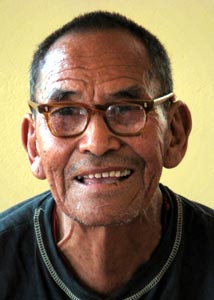Name: Migmar
(Alias: Yes)
Gender: Male
Interview Age: 81
Date of Birth: 1929
Birthplace: Kala, Utsang, Tibet
Year Left Tibet: 1959
Profession: Farming
Monk/Nun: No
Political Prisoner: No

Interview No.: 3M
Date: 2010-04-06
Language: Tibetan
Location: Doeguling Settlement, Mundgod, Karnataka, India
Categories: Chinese Invasion and Occupation
Keywords: business practices/livelihood, childhood memories, Chinese -- first appearance of, Chinese -- oppression under, Chinese rule -- life under, escape experiences, refugee in India -- life as, taxes, thamzing/struggle sessions, Utsang
Summary:
Migmar was born in a large family of 11 members. His parents died when he was very young and he was brought up by his maternal uncles. Migmar's family owned donkeys and he transported seeds and manure to towns like Phari. He tells about his life as a transporter. According to Migmar, all the land belonged to the government of Tibet. There were rich families called trelpa 'tax payers' from whom the poor people leased lands for cultivation. Migmar's family grew barley, but transporting goods was their main source of income.
Migmar provides a detailed account of how the Chinese divided the Tibetan society into the wealthy, the farmers and the poor and how they created animosity amongst them. The Chinese redistributed some of the wealth amongst the poor families, but kept much of the jewelry and furs for themselves.
Migmar describes his concern about the new roads the Chinese began to build using Tibetans as laborers. Migmar witnessed thamzing 'struggle sessions' and explains how the fathers from the wealthy families were publicly humiliated and imprisoned. Migmar's brother was secretly informed that he would be subjected to thamzing, and the family chose to escape to India.
Interview Team:
- Marcella Adamski (Interviewer)
- Tenzin Yangchen (Interpreter)
- Pema Tashi (Videographer)

